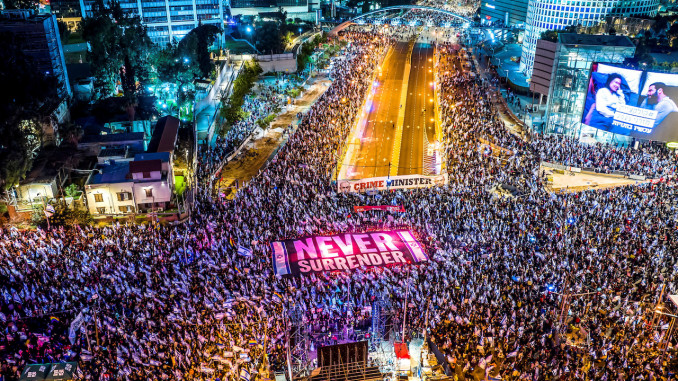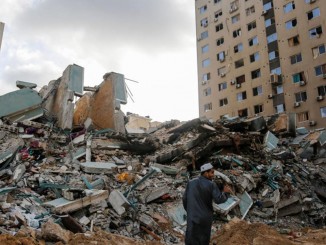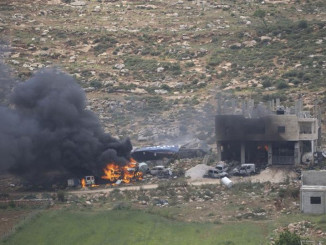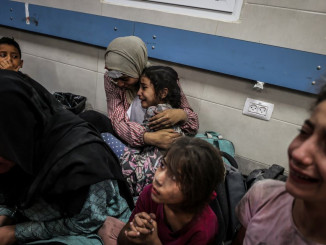
The state of Israel has seen thirteen weeks of intense protest over the government’s proposed changes to the judicial system. On Sunday and Monday of last week the protests reached a high point. Israel’s labor union, the Histadrut, representing 700,000 workers, has called a general strike. The countries universities are all on strike. The Israeli financial sector and high tech companies have made clear their opposition to the government. Israeli embassies around the world are shut down in protest of their own government, and the Israeli ambassador to the United States has resigned. Most problematic for the Israeli government, Israel’s military reservists have refused to serve if the judicial reforms are carried out, and Israeli Air Force pilots have refused to attend training. Israel’s political system is in a state of crisis. What is behind these events?
Netanyahu’s Coalition
Israeli Prime Minister Benjamin Netanyahu is behind the recent events in Israel. His government, its ministers and officials, represent a far-right political coalition. Netanyahu’s partners in the coalition are representatives of the most right-wing sections of the Israeli political spectrum. The parties that make up Netanyahu’s coalition include ultra-Orthodox Jewish political parties who want restrictions on LGBTQ and women’s rights, and increased influence and state support for religion in public life. The coalition also includes ultra right-wing nationalist parties that want the state of Israel to apply more brutal repression to the Palestinian people — those in Israel, and those who live under Israel’s military occupation of the West Bank and the Gaza strip.
Palestine is Still the Question
Behind everything stands the Israeli state’s genocidal colonial policy towards the Palestinians. Israel was founded in 1948 by forcibly expelling the Palestinian population from three quarters of Palestine. The remainder of Palestinian land fell under the control of the states of Jordan and Egypt. Palestinians became refugees. A small minority of Palestinians remained in the new state of Israel and have lived there ever since. Today they make up one fifth of the total population of Israel. Palestinians in Israel are second class citizens, systematically deprived of access to resources, education, and the other benefits accorded to Israeli Jewish citizens.
In 1967, Israel waged a war against the neighboring Arab countries, and seized the West Bank, Gaza, and a region called the Golan Heights, formerly part of Syria. Since that time, Palestinians in the West Bank and Gaza have lived under military occupation. Today, the Palestinians in the West Bank and Gaza number two million people. While these territories have been occupied, Israel’s colonization project has continued. Armed settlers seized land and built settlements, or occupied parts of cities like Jerusalem and Hebron. Today there are 622,670 Israeli settlers in the West Bank.
Since 1967, Israel, under every government administration, has engaged in a non-stop colonization process. This colonization has proceeded for decades under the cover of a negotiated peace process, carried out by a supposedly democratic Israeli state. However, Netanyahu’s ruling coalition has no patience, either for democracy in Israel or restraint in the West Bank. They represent a political force that aims to take control, push Israeli society in a nationalist, religious direction, and accelerate the ongoing colonization of Palestinian land. The ambitions of this governing coalition have provoked the current crisis.
What Did Netanyahu Do to Anger the Public?
The protest movement was instigated by Netanyahu’s goal, based on the demands of far-right and religious parties in his coalition, to put the Israeli judiciary under the control of the executive branch. This would give Netanyahu’s coalition, and any future government, vastly expanded power to push through the policies they want. As it stands, the Israeli courts, and especially the supreme court, are an obstacle to the unrestricted expansion of settlements, and campaigns of violence and expulsion against Palestinians in Jerusalem and the West Bank. In addition, the courts can still put up obstacles to religiously motivated policies that the religious parties want. The courts also serve as a protection of free speech, the electoral process, and civil rights for Israelis. Putting the courts under the control of the ruling government would remove this obstacle. This move by the Netanyahu government has faced a great deal of opposition from sections of the Israeli public who do not want to live under a religious semi-dictatorship.
In addition to these policies, Netanyahu himself faces charges of corruption, bribery, and fraud for his cozy relationships with businessmen and politicians in Israel and the United States. Putting the courts under the control of Netanyahu’s government would have the obvious result of shielding him from prosecution. Many in Israel see Netanyahu’s policies, not just as a bid for power by the right-wing, but as an attempt by a corrupt politician to protect himself.
The Latest Crisis
On Saturday, Israeli defense minister, Yoav Gallant, called for a halt to Netanyahu’s government’s judicial reforms. But Gallant isn’t really part of the opposition to these reforms. He is a former general with a long military career. In 2008 to 2009, Gallant was in charge of the Southern Command which launched a war against Palestinians in Gaza resulting in the deaths of 1,400 Palestinians. Gallant is even a supporter of the judicial reforms. His only problem with them is that they have provoked such massive demonstrations, and created a security crisis by provoking protests in the military. Netanyahu responded by firing Gallant.
The Netanyahu government is caught in a trap of sorts. The right-wing and religious parties demand judicial reform so they can carry out their plans. However, a substantial section of society is opposed to this move, and is ready to protest in massive numbers, including in the military and with strikes organized by the unions. The rhetoric on both sides has been extreme. Israel’s president (a largely ceremonial post, unlike in the U.S.), Isaac Herzog, has warned that Israel is moving towards a civil war. For now, Netanyahu has delayed the judicial reforms while the Knesset, Israel’s parliamentary body, is in recess.
Which Way for Israel?
The protests in Israel are unprecedented, numbering some 500,000 in a country of ten million people. In the U.S., that would be the equivalent of demonstrations of 15 million people. In addition, the strike by the Histadrut trade union, representing 700,000, is a huge show of force by workers. However, this movement has remained within the bounds of Israeli politics, the same politics whose dynamics produced the Netanyahu government. The demonstrators have turned out with Israeli flags, and avoided addressing the issue of the occupation, or the second class citizenship of Israeli Palestinians. The protests are motivated and dominated by the Israeli political left politicians and parties, who are just as complicit in the occupation as the right-wing. Palestinian citizens of Israel have not substantially taken part in the protests.
The crisis demands that Israelis take a hard look at the occupation. Netanyahu’s power base was created by the occupation and the religious settler movement to colonize Palestine. Since 1967 the Israeli state has supported and encouraged these elements, no matter which party was in power. To achieve their goals, to maintain the brutal occupation and expand their colonization of Palestine, they are willing to transform Israel into an authoritarian, religious state, without civil rights and democratic freedoms, even those that Israeli Jewish citizens have enjoyed. They aren’t going away, and no amount of wishing will turn back the clock to the days when Israeli Jewish citizens’ rights were secure. Palestinians rights, of course, were never secure as they were subject to second class citizenship in Israel, or military occupation in the West Bank and Gaza.
Underneath the crisis, the occupation of Palestine is still the problem, and only an end to the occupation and oppression of Palestinians, both in Israel and the occupied territories, will begin to address that problem. This may in fact require a bigger struggle than anyone in Israel imagines. Not only must the occupation come to an end, all Palestinians under Israeli control, a population equal to the number of non-Arab Israelis, must be given something to fight for, and an equal role in the struggle to build a new society. Otherwise, those in Israel who protest Netanyahu while defending the very system that created him are doomed to fail.




